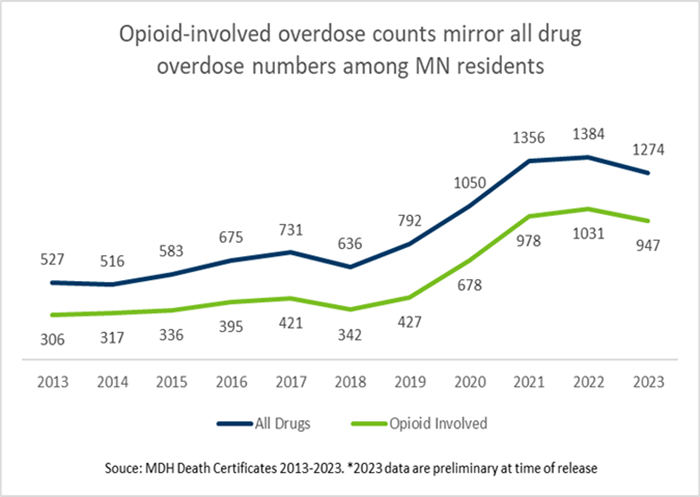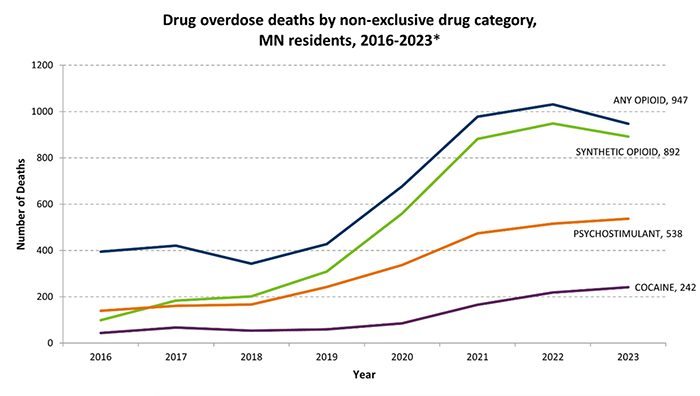Legislative Session Starts; MMA to Focus on 5 Major Issues
February 19, 2026
State lawmakers returned to St. Paul on February 17 for the second half of the 2025-2026 biennium.
October 10, 2024
From 2022 to 2023, Minnesota saw an 8% decrease in overall drug overdose deaths from 1,384 to 1,274 deaths among residents in the state, according to preliminary data from the Minnesota Department of Health (MDH).
Though the numbers are still preliminary, 2023 likely marks the first time since 2018 that Minnesota has seen a drop in total overdose deaths among its residents.
Greater Minnesota experienced a 21% decrease in overdose deaths (482 to 381 deaths). The seven-county metro area saw a 1% decrease as well (902 to 893 deaths).
Nonfatal overdoses involving opioids other than heroin (like fentanyl) increased by 11% (4,328 to 4,819 overdoses).
“We have seen a decline in opioid deaths, alongside an increase in nonfatal overdoses, in part due to greater naloxone availability,” said Minnesota Commissioner of Health Brooke Cunningham, MD, PhD.
“This is encouraging news, but there is much more to do,” said Addiction and Recovery Director Jeremy Drucker.
Total overdose deaths essentially plateaued with a slight increase between 2021 and 2022, though early preliminary numbers had indicated a potential drop. These numbers are preliminary and are likely to increase when final, because they do not include Minnesota residents who might have died from an overdose while in another state.
Most fatal overdoses (about 70%) involved synthetic opioids like fentanyl. However, the number of opioid-involved deaths in Minnesota was also down 8% from 2022 to 2023 (1,031 to 947 deaths), according to preliminary data.

Minnesota overdose deaths in the synthetic opioid category that includes fentanyl are down 6%, (949 to 892 deaths). Most cases in this category are assumed to involve illicitly manufactured fentanyl. All other opioid related categories including prescription opioids, heroin and methadone continued to see a decrease in deaths.
Minnesota’s preliminary 2023 overdose data is reflective of national trends. The U.S. Centers for Disease Control and Prevention (CDC) reports a nationwide 3% decrease in all overdose deaths from 2022 to 2023.
While opioid-involved deaths went down in 2023, deaths from the psychostimulant category, which includes methamphetamine, continued a 10-year upward trend with methamphetamine deaths increasing 4% (516 to 538 deaths) and cocaine 11% (219 to 242 deaths).

For every one overdose death in 2023, there were nearly 13 nonfatal overdoses treated in Minnesota hospitals, with the number of visits remaining elevated but stable from 2022.
As drug overdose remains a crisis in Minnesota that impacts communities to varying degrees, MDH, Tribal nations, local public health and health organizations have increased their investments in overdose prevention activities. Minnesota continues to be on the forefront of overdose prevention.
Gov.Tim Walz and Lt. Gov. Peggy Flanagan’s 2023 One Minnesota Budget included more than $200 million to address substance use and overdoses - with $50 million of that coming to MDH over the next four years. The investment addresses prevention, harm reduction, treatment, and recovery.
Additionally, the governor and Legislature passed a policy to reduce drug overdose deaths by requiring all schools, law enforcement officials, emergency responders and residential treatment programs to have naloxone on hand. MDH and the Minnesota Department of Education have posted a toolkit to help schools obtain cost-free naloxone and implement the new requirement.
Additional state-led activities include expanding medication for opioid use disorder (MOUD); establishing new peer recovery support systems; and launching the MN Naloxone Portal where mandated groups, Tribes, Syringe Service Programs and organizations serving unsheltered Minnesotans can access no-cost naloxone. From September 2023 through July 2024, more than 124,000 nasal naloxone kits were distributed through this portal. Collaboration with other state agencies and federal funding partners help make this overdose and substance use response work possible.
Read the full 2023 preliminary report here.
February 19, 2026
State lawmakers returned to St. Paul on February 17 for the second half of the 2025-2026 biennium.
February 19, 2026
On the second day of the legislative session, MMA leadership was already advocating for one of its top priorities - minimizing the harm of federal changes to Medical Assistance (MA).
February 19, 2026
Legislation to prohibit the use of artificial intelligence (AI) in prior authorization requirements was heard in the House Commerce Finance and Policy Committee on February 19.